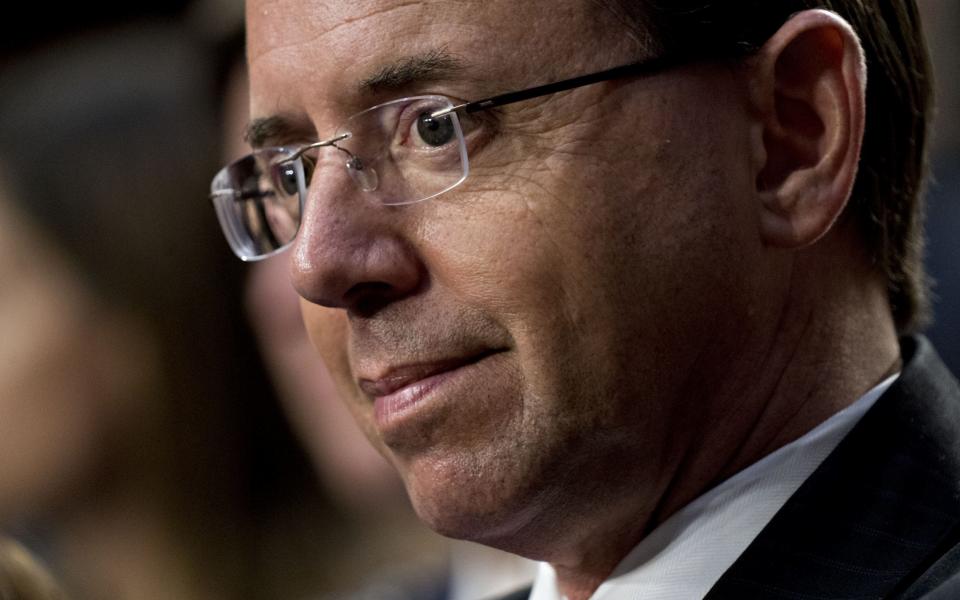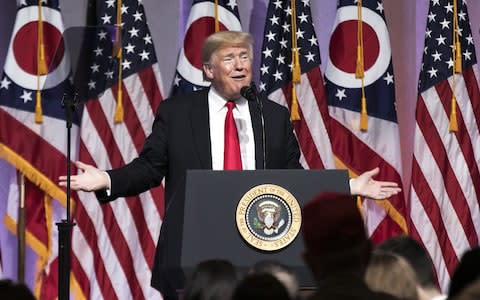Rod Rosenstein, US official overseeing Russia probe, on brink of departure after day of intense speculation

Rod Rosenstein, the US deputy attorney general who oversees the Russia investigation, appeared on the brink of departure on Monday in the wake of bombshell claims that he suggested secretly recording Donald Trump.
In a day of fevered speculation about his future in Washington, Mr Rosenstein was reported to have either offered his resignation or expected to be fired at a meeting in the White House.
However, with cable news leading on the developments, Sarah Sanders, the White House press secretary, said Mr Trump would meet Mr Rosenstein on Thursday, confirming he would remain in post for now.
Mr Trump and Mr Rosenstein had an “extended conversation” about the reports of what the latter had said behind closed doors, Ms Sanders added. There was no word on his future beyond Thursday.
The departure of Mr Rosenstein, who oversees the Russia probe because attorney general Jeff Sessions recused himself, would come at a critical time for the investigation.

Mr Rosenstein appointed Robert Mueller as special counsel to investigate Russia election meddling in May 2017 and has given the investigator considerable leeway, defending his right to pursue his inquiries without interference.
Whoever replaces Mr Rosenstein would take over the power to approve or block legal requests from Mr Mueller, such as for subpoenas, and could take a stricter stance on what the inquiry can pursue.
Mr Rosenstein's position has appeared precarious for days after a New York Times report which revealed details of private discussions he had in the wake of Mr Trump’s firing of James Comey, the FBI director, last year.
Mr Rosenstein was said to have floated wearing a wire to record the president and discussed the 25th Amendment – a way to remove the president if he is deemed unfit for office – during conversations with Justice Department and FBI officials, according to The New York Times.
Mr Rosenstein said the story, published on Friday, was “inaccurate and factually incorrect”, adding: “Let me be clear about this: Based on my personal dealings with the president, there is no basis to invoke the 25th Amendment.”

Later that day Mr Rosenstein released a second more strongly worded statement: “I never pursued or authorised recording the president and any suggestion that I have ever advocated for the removal of the President is absolutely false.”
On Monday, both CNN and the political website Axios reported that Mr Rosenstein had discussed his resignation in the wake of the reports with John Kelly, the White House chief of staff.
The pieces triggered a firestorm of speculation as Mr Rosenstein headed to the White House for a meeting. White House sources appeared to be indicating he would be resigning while Justice Department suggested he expected to be fired.
Then the White House announced the Thursday meeting with Mr Trump, effectively delaying a final decision. Mr Trump is currently in New York for a United Nations gathering.
The manner of Mr Rosenstein’s departure would be critical. If he is fired, the departure could add to allegations that Mr Trump has obstructed justice in his handling of the Russia probe – claims which Mr Mueller is investigating.

His position would likely pass to the next-ranking official who has been confirmed by the Senate, who in this case would be Noel Francisco, the current solicitor general. He has previously been critical of FBI overreach.
Mr Rosenstein has been a target of tweeted criticism from Mr Trump in the recent past as the president has railed against the Russian investigation “witch hunt” which is overshadowing his presidency.
The probe was set up to look into election meddling but has widened into investigating the Mr Trump’s behaviour since taking office.
There has been growing speculation that Mr Sessions, another common target of Mr Trump’s ire for stepping away from the Russia probe, could be fired after the midterm elections on November 6. There was no word on Mr Sessions’s fate on Monday.

With Mr Rosenstein’s future hanging in the balance, Democratic congressmen and former justice officials rallied to his defence and warned off the White House.
Andrew McCabe, the former FBI deputy director pushed out by Mr Trump, said there is “nothing more important to the integrity of law enforcement and the rule of law” than protecting the Russia probe, adding he would be concerned that the investigation would be “at risk” if Mr Rosenstein left.
Ms Sanders’s statement in full read: “At the request of Deputy Attorney General Rod Rosenstein, he and President Trump had an extended conversation to discuss the recent news stories. Because the President is at the United Nations General Assembly and has a full schedule with leaders from around the world, they will meet on Thursday when the President returns to Washington, DC.”

 Yahoo News
Yahoo News 